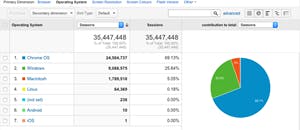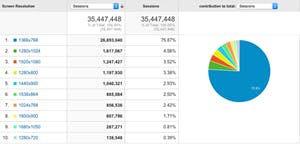Educational Technology and Protecting Student Privacy
Everyone is talking about Data Security and Privacy these days - and rightly so. The fantastic benefits that the Cloud and Chromebooks in particular have brought to education also have their trade-offs, and CIO’s need to be sure that suppliers are taking their responsibilities with your District and Student data seriously.
I thought it would be useful to help schools who are going through this transition by creating a checklist - A list of questions to ask your software supplier to help manage your risk, and ensure the safety, security and privacy of your data.
Remember, under FERPA it is the District’s and School’s responsibility to look after the data - Schools need to satisfy themselves that their data is being treated properly if they entrust a software provider with it.
Digital Security
Is all data encrypted in transit?
This sounds complex, but it is pretty easy to understand - we have all learned not to use our credit cards on a website unless we see the padlock icon, and we can see HTTPS at the start of the URL. This means that your Credit Card details are encrypted as they are sent to the website. You should ensure that your ed tech software provider is using HTTPS to encrypt all the data that is transmitted or received from your district. This is to stop a “man in the middle” attack, where a hacker can listen to the data as it passes through the network - if it is encrypted they cannot understand it.
Is all data encrypted at rest?
When the data is stored in your provider's database it should also be encrypted. This is for several reasons, but the two most obvious are to prevent unauthorised employees at the provider from accessing the data, and also making the data useless in the event that the server or hard disk is stolen.
What data is the supplier actually storing?
If your supplier does not need the data to fulfill the purpose of the software or contract, then it should not collect and store it at all. This is a simple and obvious premise, but is often overlooked. Most SAAS (software as a service) has a privacy policy that lists what personal data the software stores and why they need to have it.
For example, with Read&Write for Google Chrome™ we need to store encrypted individual user IDs so that we can tell if someone is licenced or not. That is the only potentially personally identifiable information we store for that product.
What permissions does the software need and why?
In the old days of Windows or Mac when you installed a piece of software, you basically had to trust it with everything. Software running on Windows could read all the data on your hard drive, and you just had to accept that. Nowadays with Google Chrome Apps and Extensions you can clearly see the permissions that the software is asking for at installation time. Responsible software vendors will do the following:
- Provide you with a clear list of the permissions the software needs
- Tell you why it needs them
- Inform you if these requirements change
With assistive technology these permissions often look pretty scary, but when you understand what the AT needs to do, it should appear much more reasonable. Assistive Technology is used to read text aloud from Web Pages and so it needs the scary looking permission “Access your data on all websites”. But every screen reader needs this permission. Google Chrome requires that screen readers and text readers have this permission to enable the AT to access the text and turn it into speech.
Does the supplier have a formal Data Security Policy?
A good supplier will have a formal Data Security Policy, possibly audited and approved by an external standards body such as ISO. The data security policy should cover how your data is stored, and what the supplier does to protect it. Some things to look out for in the policy are:
- Is there a good strong password policy in place with 2 factor authentication?
- Is there a formal role in the company relating to Data Security, such as the Data Security Officer?
- Is there a good Data Security Training policy in place for all staff members at the supplier?
- Does the company have written guidance for the development teams on best practice for keeping data safe?
- Does the company outsource any software development, and are those partners covered by the policy? When a school district trusts a company with their data, they need to be satisfied that the company does not expose this data to untrusted third parties.
- Is there good physical security in place where the servers are located?
- Is there a Business Continuity Plan in place?
- What is the Uptime Service Level Agreement? What are the penalties or refunds for an SLA breach?
- Is access to the building controlled and logged?
Security Breach Management
If a company is taking its data security seriously, they will have considered what happens if something goes wrong. Your supplier should have a documented Security Breach Procedure.
If there is a security breach a data security incident plan should be in place that should at the very least:
- Keep a list of the data/privacy officers at the school districts that are being served.
- Have a means of informing them promptly of any breach and the nature of the data involved.
- Provide regular updates to the data officers until the matter is resolved.
- Comply with any contractual obligations related to the data breach.
Texthelp’s general approach to data:
When possible ALL data should be de-identified. For example, we don’t actually store a user’s Google ID, but rather a one way encryption of it, so even our developers cannot decrypt it.
In the case of some districts, their Data Security Policies classify Meta-Data - e.g. a large picture analysis of student behaviours across a large group of students, as “Student Data”. Because of this the only person at Texthelp who is allowed unrestricted access to User Analytics is the Data Protection Officer. That person uses their knowledge of FERPA, COPPA, and the specific contracts with the districts to control access to the data. This is a documented procedure for us at Texthelp.
Usage Tracking and Analytics
With web based software one of the most useful things that software engineers can see is usage analytics. Texthelp tracks this information. It is actually very impersonal - I have included some examples below to give you a flavour of what our development team can see to help them make decisions.
Different Browsers
Most of our users are on Chrome, but we do need to support Safari, MSIE and Firefox
Different Screen Resolutions
This helps us design UI that works for everyone.
Different Operating Systems
Analytics helped us to predict the rapid swing to ChromeOS, and helped us build a product that is great for Chromebooks.
Server Load through the day
We have users in 182 countries, but the USA and Canada keep us pretty busy - we need to track users across geographies and time zones to make sure your speech, and dictionary definitions are served up promptly - even if 50,000 kids are reading different books at the same time.
This is not personal information, but an aggregated picture of use that allows us to improve our service and focus on solving the problems that are impacting the most users.
We have 1 to 2 million students who use our software for free every week. We do not know their user IDs.
What we at Texthelp do know is this:
- What district they are from (or more specifically their Google Domain)
- If we have signed a data protection agreement with the district
- If any teachers have signed up for a Free Teacher Account at the district
- How often the group of students from the district use the software, and what features they use. (we pay royalties for some features based on usage and need to track this)
- What equipment they are using (Operating System, Browser, Screen Resolution). This helps our development team and software test team know what we need to support
- Time of day and geography of network traffic at the city level. This helps us plan to have server capacity in place through the day as we have 3 million users to serve worldwide.
We are taking this very seriously.
There is a lot of fear and uncertainty about student data, and student privacy in the marketplace.
The best cure for uncertainty and doubt is information - and hopefully I have given you all some information about what we do with data at Texthelp, and some questions that you can ask your suppliers to get some comfort around how they treat your data.
Any Ed Tech company with good corporate governance will have a similar approach. If you are not sure, just ask them.
If you have any questions or want to start a dialog about this please contact me directly - m.mckay@texthelp.com.


